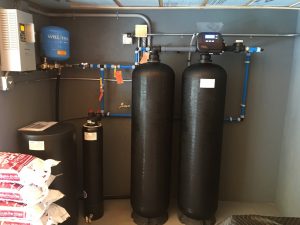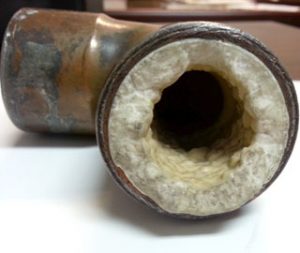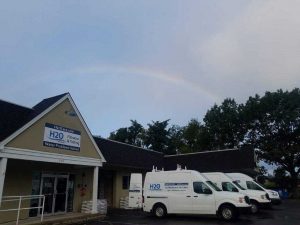
Commercial water softener in regional hospital to protect the mechanical systems
Commercial water softener technology is the same for a house as it is for a large hospital. However, volume requirements makes the design, installation, and service more complicated..
When sizing a water softening system, doing the math and getting a reasonable forecast of volume demand in gallons is important. This will help determine the size of the commercial water softener system. Water softening resin has a finite amount of water that it can soften before it needs to go into a backwash (or self cleaning) cycle. A backup softener will provide clean water while the first one is in backwash. Additionally, determining the size of the brine tank for softener salt storage is also very important. This will keep the tank filling requirements at a reasonable level for the personnel maintaining the system..

Twin 4-cubic feet Water Softeners with high-capacity sediment filter
Space available for the equipment is another important consideration. To avoid a long piping run to and from the system, a good location needs to be selected. Additionally, any space restrictions will need to taken into consideration when sizing both the softener and brine tank sizes.
WHEN TWO COMMERCIAL WATER SOFTENERS ARE NEEDED
In a hospital setting or other setting where water is being used essentially 24 hours per day, a back up softener may be required. The main reason for this is when one softener goes into its backwash cycle, the second softener will be able to provide a steady supply of softened water to the facility. Without this backup, unconditioned water will be pulled through the system while the softener is in the backwash cycle. In the photo at the top of the page, this system is feeding make-up water to the boiler. It has to be clean water 24 hours a day.

Damaging Hard Water
For more on water softening and how it works, see the link at Water Softening.


H2O Care, Inc. is an established water filtration and testing firm, founded in 1989. Offices are located in Stow, Middleton & Lakeville, MA. Reach us at service@h2ocare.com or 978-777-8330. See our published articles in Water Technology Magazines at https://publications/.

Water Treatment – Milford
